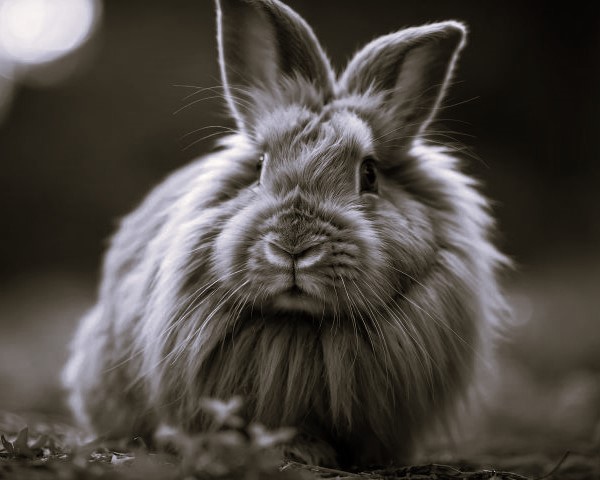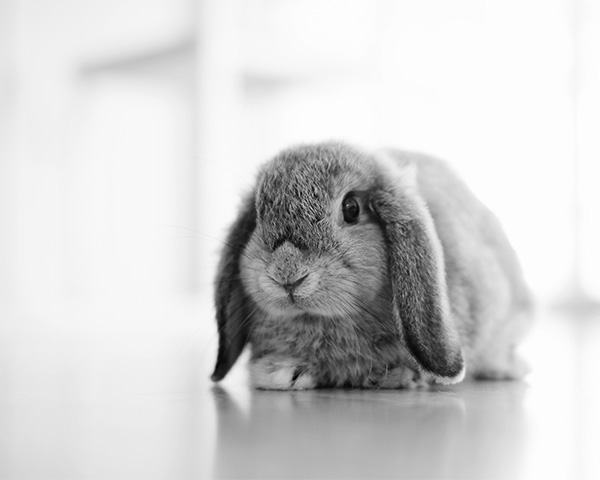Lionhead rabbit breed information and advice
Sometimes called a Dutch Lop rabbit, the Holland Lop is a small and cute rabbit breed. Energetic, playful, and sometimes skittish, these mini lop-eared rabbits are fantastic family pets that can happily snuggle up in your palms.
Learn more about the Holland Lop and find out if the breed is right for you.
Lionhead facts

| Lifespan | 7 – 9 years |
| How much | £25 – £170 |
| Size | 20 – 25 cm |
| Weight | 1 – 1.5 kg |
| Colours | Black, lilac, blue, chestnut, chocolate, white |
| Grooming | Brush mane daily, groom body weekly |
| Temperament | Docile, friendly, intelligent |
| Exercise | A minimum of four hours daily |
Insurance for your Lionhead rabbit
Lionheads are dinky bunnies with a big personality. But because of their size, they can be delicate and vulnerable to certain health conditions.
Common health problems that can affect Lionhead rabbits include:
Rabbit insurance can cover the cost of vet bills, medication and treatment, so you can keep your Lionhead bunny hopping and healthy.
Sainsbury’s Bank Pet Insurance
Protect your furry friend with Lifetime cover. We’ll cover your bunny for vet bills of up to £2,000 every year. We can also pay your vet directly for selected issues, giving you one less thing to think about.
You can claim towards:
- Dental cover
- Physiotherapy
- Advertising and rewards
- Herbal and homeopathic medicine
- Accidents, injuries and poisonings
- Emergency boarding or retreat fees
Lifetime is our most comprehensive policy that’s tailor made for rabbits. You can take out a new policy for your bunny from eight weeks old – right up until their fifth birthday. Simply renew your policy every year and we’ll cover your lionhead bunny during its lifetime.
Rabbits work well in pairs – if you have more than one bunny, or other pets at home, we also offer multi-pet insurance discount.
Please note that we won't cover any pre-existing conditions and that terms, conditions, excesses, exclusions and limitations apply.
How to care for a Lionhead
Lionheads are lovable balls of fluff that love to cuddle and play. But like other bunnies, they need lots of attention and care to help them live a long and happy life.
Feeding and nutrition
Lionheads require high-quality fresh hay and grass for essential fibre and digestive health. They also enjoy fresh veg like celery and lettuce, as well as sweet potato and rabbit pellets.
Contrary to popular belief, you shouldn’t feed your lionhead bunny too many carrots – this can lead to digestive issues such as diarrhoea or bloating. Fruit can also serve as an occasional treat, and can form 5% of a rabbit’s diet.
In addition to hay, Lionheads should always have fresh water to drink. Ensure you check their water bottle or bowl is clean and full every day.
Grooming
Lionhead bunnies are characterised by woolly medium-length fur that requires more grooming than other breeds. You should brush their hair two to three times a week, and daily during moulting in the spring or autumn.
Lionheads can have either a single or double mane. Single-maned Lionheads have fur circling their head when young, but it may reduce with age. A double-mane Lionhead can keep their thick mane for life, which can also extend to their flanks.
As well as their fur, it’s important to check their ears for debris and trim their nails every month.
Exercise
Lionheads may be small, but they’re an energetic breed that need plenty of exercise. Giving them enough space to hop and bounce for a few hours a day can help to burn calories.
If your lion rabbit is kept in a cage, it’s important that it’s big enough for them to fully stretch on their hind legs. They should also have access to an enclosed run with tunnels and solid floor ramps to keep moving. Before taking them out of the cage, make your home rabbit proof and secure enough for them to roam.
Training
Lionheads are intelligent bunnies that respond well to basic training commands. Litter training will be much easier than with other breeds. And with positive reinforcement and rewards, you can train them to fetch toys, jump and even walk (or hop!) on a lead.
Providing your lion-maned rabbit with toys can keep them stimulated and prevent boredom, which can lead to behavioural problems.
Temperament and behaviour
Lionhead rabbits are sweet, friendly and good-natured. They are known to form close bonds with humans and other pets. Outside of their cage, they enjoy playing and cuddling with their family.
Lionheads thrive on companionship, so keeping another bunny can satisfy their social needs. Be careful not to frighten them; Lionheads can be skittish if they feel unsafe or insecure.
Giving your Lionhead bunny plenty of stimulation through toys can keep them busy and alert.
Common health problems
Lionhead rabbits are miniature and fragile with a lot of fur, so they can be susceptible to various health conditions. It’s important to keep up with regular vet checkups and protect them with rabbit insurance.
Fly strike
Fly strike, or myiasis, happens when a fly lays eggs on a rabbit’s fur. These eggs hatch into maggots which eat into the rabbit’s flesh. Rabbits with fly strike will have large, painful wounds that can be fatal if left untreated.
Lionheads have longer fur that is at greater risk of fly strike if it is wet. If you let your Lionhead outside, always check their skin for scabs or sores, and comb their fur thoroughly to rid of any fly eggs or maggots.
If you spot any, contact your vet immediately. They will clip the affected fur, clean the wound and provide pain relief and antibiotics.
Spinal injury
Lionheads, like all rabbits, have delicate spines. Frightened or startled rabbits may suddenly kick their hind legs when being picked up, leading to a spinal injury. Their spines can also become damaged when handled incorrectly or dropped.
Treatment depends on the severity of the fracture and the rabbit’s general health. Some spinal injuries can result in paralysis or bladder incontinence. It’s possible to cure spinal trauma through anti-inflammatory medication.
Brachycephalic syndrome
Brachycephaly affects the breathing, tooth growth and tear ducts of short-nose bunnies. Over recent years, Lionhead rabbits have been increasingly bred with flattened faces, making them vulnerable to this condition.
In brachycephalic Lionheads, the top jaw grows longer than the bottom (known as malocclusion), which can lead to dental problems such as overgrown teeth. Respiratory issues are also common. Rabbits only breathe through their nose. If you see your lion bunny breathe through their mouth, this could be a sign that there’s a problem.
Rabbit Haemorrhagic Disease (RHD)
RHD is another common viral disease that attacks the rabbit’s internal organs, causing them to haemorrhage. This disease comes in two forms, RHD1 and RHD2, both of which are fatal in most cases.
Rabbits with RHD1 become suddenly ill and may pass away within two days of catching it. RHD2 develops slowly and is typically less aggressive. Signs of infection can include lethargy and anorexia, to sudden and unexplained death.
Rabbit vaccinations are the best prevention for RHD. Your Lionhead bunny can be vaccinated from five weeks old.
So, is a Lionhead right for you?
Lionheads are bundles of cuteness with great personalities. They’re fairly outgoing, docile and love attention. If you’re looking for a cuddly pet to play and interact with, the Lionhead can be the one for you.
Like other rabbits, they need lots of TLC, including exercise, a balanced diet and toys for enrichment. But Lionhead bunnies need regular grooming to tame that wild mane of theirs. They’re also smaller than your average rabbit, so take extra special care when handling them, and always supervise them with young children.
Frequently asked questions
How long do Lionhead rabbits live?
The average lifespan of a Lionhead rabbit is around 7-9 years. Protecting your little lion bunny with rabbit insurance can be the first step to helping them lead happy, healthy lives.
Do Lionhead rabbits need grooming?
Yes, Lionhead rabbits need grooming more often than other rabbit breeds because of their medium, mane-like fur. Routine brushing is crucial for a Lionhead’s overall health, as it helps to prevent hair and skin issues.
How big does a Lionhead rabbit get?
Lionheads are a dwarf breed, so they’re on the smaller side. A full-grown lionhead rabbit will reach around 20-25 cm long, which is half the size of a standard bunny.

Browse our guides
Choose from our list of helpful guides and information

Explore rabbit breeds
Find out how to keep your rabbit healthy and happy

Cat breed guides
How to care for your cat, common health problems and more
Terms and conditions
Important information
* The discount is based on information related to you and the Sainsbury’s and Sainsbury’s Bank transactions linked to your Nectar account. For more information on how we use your data, go to sainsburysbank.co.uk/privacy
Sainsbury's Bank plc, Registered Office, 33 Holborn, London EC1N 2HT (registered in England and Wales, no. 3279730) is authorised by the Prudential Regulation Authority and regulated by the Financial Conduct Authority and the Prudential Regulation Authority (register no. 184514). Sainsbury's Supermarkets Ltd is an appointed representative of Sainsbury's Bank plc.
Sainsbury's Bank plc acts as an introducer to Pinnacle Insurance plc who is authorised by the Prudential Regulation Authority and regulated by the Financial Conduct Authority and the Prudential Regulation Authority (register number 110866). Registered Office: Pinnacle House, A1 Barnet Way, Borehamwood, Hertfordshire, WD6 2XX. Sainsbury’s Bank plc and Pinnacle Insurance plc are not part of the same corporate group.
